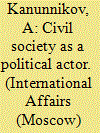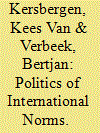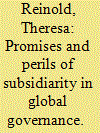|
|
|
Sort Order |
|
|
|
Items / Page
|
|
|
|
|
|
|
| Srl | Item |
| 1 |
ID:
181358


|
|
|
|
|
| Summary/Abstract |
THE PARTICIPATION of civil society in the politics of various countries is receiving increasing scholarly attention. Two clashing opinions regarding the place and role of civil society in today's world stand out in works written on this subject. Some researchers believe that civil society organizations should stay out of politics, while others insist that involving all civil society groups in the political process is vital to obtaining unique and accurate information necessary for political decision-making. Moreover, in European Union countries, for instance, persistent efforts have been made in recent years to improve governance mechanisms by drawing civil society into this integration organization at various levels [2].
|
|
|
|
|
|
|
|
|
|
|
|
|
|
|
|
| 2 |
ID:
139617


|
|
|
|
|
| Summary/Abstract |
Recent years have seen several studies and proposals from national parliaments (NPs) to deepen their direct involvement in European decision-making, most notably by strengthening the early warning mechanism (EWM – also known as yellow card procedure). The EWM is a technical-legalistic procedure that is restricted to subsidiarity. This ‘straightjacket’ is too limited as a monitoring tool for European policies more broadly and can hardly be seen as a response to current democratic concerns. Framing the EWM as a democratic solution to empower NPs thus risks becoming one of Europe’s empty mantras.
|
|
|
|
|
|
|
|
|
|
|
|
|
|
|
|
| 3 |
ID:
160219


|
|
|
|
|
| Summary/Abstract |
The provisions of the 1999 Constitution, which recognises the existence of a single police force and forbids parallel police organisations, have oftentimes generated controversies among actors in the Nigerian federal polity. Rising insecurity precipitates lingering questions on the utility and adequacy of a single, highly centralised and centrally controlled police force given Nigeria’s geographic vastness and demographic diversity. Conversely, arguments have also dwelt on the dangers of fragmentation considering Nigeria’s psychosocial, economic and political nature. This article attempts to balance these arguments by analysing policing and the operations of the Nigeria Police Force (NPF) through the lens of the subsidiarity principle. Subsidiarity is a governance principle in federations, captured in the founding documents of the European Union (EU), which prescribes that governmental powers, authorities and duties should be held by the tier that can best perform them equitably, efficiently, effectively, suitably and based on interest and need. Drawing largely on interviews with purposively selected police scholars, political actors, civil society organisations and police personnel, the paper contends that this principle offers a pragmatic solution to the perennial problems of intergovernmental frictions on the use of the police within the context of governance in the Nigerian federation.
|
|
|
|
|
|
|
|
|
|
|
|
|
|
|
|
| 4 |
ID:
184116


|
|
|
|
|
| Summary/Abstract |
In this article, we investigate how the EU mobilises a spatio-temporal imaginary of the “local” in its counter-radicalisation activities as a means of navigating subsidiarity principles and expanding its remit as a “holistic security actor” (cf. Baker-Beall [2016]. The European Union’s fight against terrorism: discourse, policies, identity. Manchester: Manchester University Press). Extant work on the EU’s terrorism prevention efforts has focused on how the organisation constructs transnational terror threats that require supranational, EU-level responses. Our research makes an original contribution to these literatures by demonstrating how the EU also seeks to intervene “below” the level of the nation state. EU counter-radicalisation works directly with subnational actors in municipalities, cities, and frontline public services across Member States. Employing the first systematic analysis of the EU’s Radicalisation Awareness Network (RAN) outputs, we demonstrate how “the local” frames pre-emptive counter-terrorism interventions as “upstream”. “Closer”, or “localised”, reads as “earlier” in this discourse. We also unpack how EU institutions and Member States have voiced concerns about the circumvention of subsidiarity (through engagement with local actors across the Union), by criticising the “effectiveness” of RAN. While the European Commission has taken steps towards addressing these grievances, its proposals reflect a further renegotiation and repositioning of the EU as a security “facilitator” across spaces deemed simultaneously local and transnational.
|
|
|
|
|
|
|
|
|
|
|
|
|
|
|
|
| 5 |
ID:
077414


|
|
|
|
|
| Publication |
2007.
|
| Summary/Abstract |
Theories on the role of norms in international relations generally neglect the possibility that after their adoption a new battle over their precise meaning ensues, especially when a norm remains vague and illusive. Norm implementation is not only a matter of internalization and compliance, but also of redefinition. Building on insights from rationalist and constructivist approaches, this article advances the idea of recurrent battles for and over norms in international politics. It argues that the analytical tools of international regime theory are instrumental in tracking such battles. This framework is applied to the history and role of subsidiarity as a norm in the competence regime of the European Union between 1991 and 2005. Its main finding is that the issue of subsidiarity was not a matter of norm internalization, but concerned a recurrent battle between old and newly empowered actors over its precise meaning, eventually favouring the member states' prerogative
|
|
|
|
|
|
|
|
|
|
|
|
|
|
|
|
| 6 |
ID:
168490


|
|
|
|
|
| Summary/Abstract |
In the messy world of global governance, the principle of subsidiarity has the potential to order relations between different layers of governance as well as compensate for the legitimacy deficit of global governance institutions. However, subsidiarity has received surprisingly little scholarly attention in the discipline of International Relations. This article therefore seeks to examine the promises and perils of subsidiarity in global governance by adducing empirical evidence from Africa, a region which has authored norms and policies that often contest global norms and institutions. Based on two case studies of pro-democratic intervention in The Gambia and court proliferation at the (sub-)regional levels, the article concludes that while subsidiarity may strengthen democracy and the rule of law at the national level, it may also undermine the rule of law at the global level, as well as dilute fundamental global norms that serve to protect basic human rights. At the same time, subsidiarity provides opportunities for normative innovation, which suggests that more attention needs to be paid to the law-generating effects of subsidiarity and to the Global South as an agent of change in international law and global governance.
|
|
|
|
|
|
|
|
|
|
|
|
|
|
|
|
|
|
|
|
|